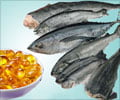Exposure to mercury increases the risk of a nervous disorder and the primary source of exposure to mercury is through eating fish contaminated with the neurotoxic metal.

- Amyotrophic lateral sclerosis (ALS) is a neurological disease that takes away the ability of nerve cells to interact with the body's muscles. //
- Fish and seafood which have a high mercury content increases the risk of ALS.
- Swordfish and shark are examples of fish that are considered high in mercury, while salmon and sardines typically have lower levels.
- The US FDA recommends salmon or sardines that have low mercury but high omega-3 fatty acids.
Often referred to as Lou Gehrig's disease, ALS is a progressive neurological disease that takes away the ability of nerve cells to interact with the body's muscles.
Early symptoms of the disease can include muscle twitching and weakness in a limb. It typically develops into complete paralysis of the body, including the muscles needed to speak, eat and breathe. There is no cure for ALS, and eventually the disease is fatal.
For the study, researchers surveyed 518 people, 294 of whom had ALS, and 224 of whom didn't, on how much fish and seafood they ate. Participants reported the types of fish they ate, and whether they were purchased from stores or caught when they were fishing.
Researchers estimated the annual exposure to mercury by looking up the average mercury levels in the types of fish and the frequency that the participants reported eating them.
Among participants who ate fish and seafood regularly, those in the top 25 percent for estimated annual mercury intake were at double the risk for ALS compared to those with lower levels.
Those in the top 25 percent of mercury levels, based on fish-related intake or toenail clippings, were at a two-fold higher risk of ALS. These findings need to be replicated in additional studies.
The authors emphasize that this study does not negate the fact that eating fish provides many health benefits. However, the study suggests that the public may want to choose species that are known to have a lower mercury content, and avoid consuming fish caught in waters where mercury contamination is well-recognized. More research is needed before fish-consumption guidelines for neurodegenerative illness can be made.
Reference
- Elijah Stommel et al., Mercury in fish, seafood may be linked to higher risk of ALS, American Academy of Neurology 2017 Annual Meeting (2017).
Source-Medindia















